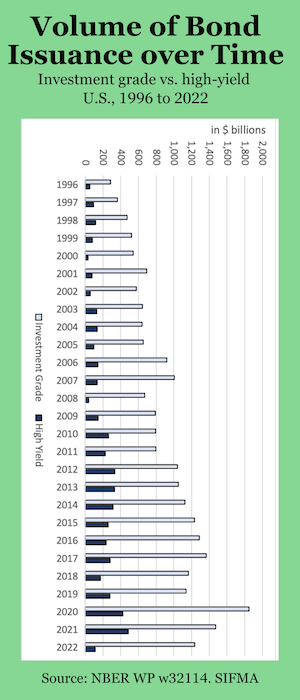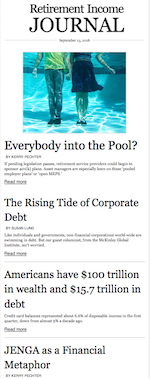More than a year after suspending the Bush-era proposals for regulating investment advice in employer-sponsored retirement plans under the Pension Protection Act of 2006, the Obama Department of Labor has proposed its own regulations.
Under the new proposed regulations, “Investment Advice—Participants and Beneficiaries,” plan participants may receive investment advice only from an advisor who is compensated on a “level-fee” basis. If the adviser uses a computer model to generate advice, the model must be “certified as unbiased.”
The main difference between the Bush and Obama regulations would probably be too subtle for most laymen to detect. But it is expected to make a significant difference in determining who can furnish advice and who can’t.
The two versions agree that a fund company investment advisor, for instance, who is hired by a plan sponsor to educate 401(k) participants, must be paid the same no matter which fund options he or she recommends to the employee.
The Bush proposal, however, exempts the advisor’s manager or broker-dealer from that restriction, so that the advisor could in practice recommend one of his employer’s funds over a competitor’s without breaking the law. The Obama proposal removes that exemption.
Advertisement Without the exemption, it is expected to be more difficult for financial services companies, or their affiliates or the affiliates’ employees, to promote their products in the workplace. It could also conceivably hurt their strategic efforts to attract 401(k) rollover money to their firms when employees retire or change jobs.
The securities industry, which lobbied for the exemption during the Bush administration, has already voiced its displeasure at the prospect of losing the exemption.
“We are disappointed the Department of Labor decided to move in this direction after having withdrawn the previous final regulations and class exemption,” said Elizabeth Varley, managing director, government affairs, at the Securities Industry and Financial Markets Association, or SIFMA, on February 26.
“The proposed regulation, if approved, will do little to expand American’s access to investment advice. Americans are seeking the best paths to saving and investing for their retirement and deserve rules that allow them to do so. Today’s move by [the Department of] Labor will hurt participants and investors, not help,” she added.
Attorney Jason C. Roberts, a benefits specialist at the Los Angeles law firm of Reish & Reicher, has written about the two sets of proposals. He described a scenario where the exemption might make a big difference to a fund company.
“Let’s say you’re an XYZ fund company investment advisor getting paid a level compensation for running a participant’s data through a computer model. Under the exemption, if the computer recommends an ABC fund, you could easily venture away from the model, recommend an XYZ fund instead, and document the reason in some way,” Roberts said.
In another scenario, he said, an RIA (registered investment advisor) with a pension consulting service whose broker-dealer is owned by a specific financial services company might, under cover of the exemption, recommend plan options that would benefit the larger company without benefiting him directly.
“There was a big push for this on the lobbying front by the conflicted companies,” he told RIJ, meaning companies facing potential conflicts of interest as providers of advice for plan participants.
“Under the Bush proposal, you would have seen a whole wave of players with conflicts of interest coming into the [401(k) advice] market. Anybody could see that the original proposal would not have been sufficient to prevent that. Now we’re seeing a paring back of that.”
Democrats have opposed the exemption from the moment—the Bush administration’s last day in office—when it was proposed. “Congressman George Miller (D-CA), Chairman of the House Education and Labor Committee, and Congressman Rob Andrews (D-NJ), immediately preceding publication of the final rule, stated that they would ‘use every tool at [their] disposal to block the implementation [of the regulation],’” Roberts wrote on his blog last year.
“The issue with the broker-dealer ‘level fee’ consideration dealt with the affiliated firms of the advisor. In January of 2009, the DoL proposed that only the advisor was required to maintain a level fee arrangement, not the firms in which he/she was affiliated,” said Chad Griffeth, AIF, president of BeManaged, a plan sponsor advisor in Grand Rapids, Mi.
“The concern created was: Where would the advisor be receiving the analytics and research for delivering advice to 401(k) investors? Probably from the affiliated firms, serving as the ‘back office.
“Hence, the potential was there for broker dealers, mutual fund companies, and insurance companies to create a ‘puppeteer’ effect, holding the advisor out to deliver level-fee advice while providing support/asset allocation services that benefited the firms potentially more than the participants,” Griffeth added.
In another provision, the new proposal restricts the use of historical performance of funds within a single asset class as a basis for recommending one fund over another, because performance is “a factor that cannot confidently be expected to persist in the future,” the Department of Labor wrote. It acknowledges, however, that different asset classes may have persistent differences in returns.
The regulation contains a number of other safeguards against conflicts of interest, including:
- Requiring that a plan fiduciary (independent of the investment adviser or its affiliates) select the computer model or fee leveling investment advice arrangement.
- Requiring that computer models must be certified in advance as unbiased and meeting the exemption’s requirements by an independent expert.
- Establishing qualifications and a selection process for the investment expert who must perform the above certification.
- Clarifying that the fee-leveling requirements do not permit investment advisers (including its employees) to receive compensation from affiliates on the basis of their recommendations.
- Establishing an annual audit of investment advice arrangements, including the requirement that the auditor be independent from the investment advice provider.
- Requiring disclosures by advisers to plan participants.
© 2010 RIJ Publishing. All rights reserved.


